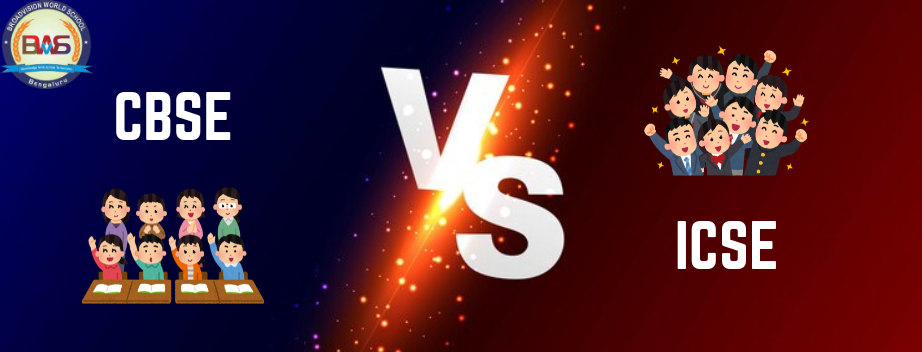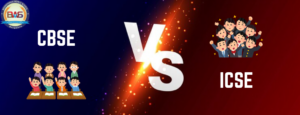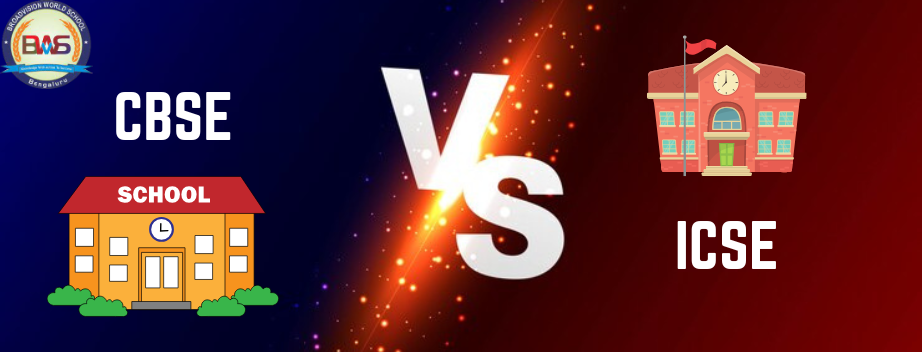Giving your child the best start in life
-
First Floor, 10A Chandos Street London New Town W1G 9LE
Get In Touch
Monday to Friday: 8.30am – 02.00pm
Saturday, Sunday: Close
Email: user@domainname.com
Phone: +44 (0) 207 689 7888

CBSE vs ICSE – Choosing the right educational board is a critical decision for both parents and students, as it lays the foundation for a child’s academic journey. Among the various boards available in India, the Central Board of Secondary Education (CBSE) stands as a popular choice for many. Its widespread recognition, comprehensive curriculum, and structured evaluation system make it a preferred option for numerous students across the country. In the following blog, we’ll explore why CBSE is often favored over the Indian Certificate of Secondary Education (ICSE) and why Broad Vision World School, affiliated with CBSE, could be a commendable choice for your child’s education.
The Central Board of Secondary Education (CBSE) shines brighter than the Indian Certificate of Secondary Education (ICSE) due to its structured curriculum, standardized assessment methods, and broader recognition. CBSE’s focused approach on core subjects like Science and Mathematics, alongside its streamlined learning methodology, appeals to students aspiring for competitive exams. Its Cumulative Grade Point Average (CGPA) evaluation system enables comprehensive assessment, facilitating easy comparison and acceptance in various institutions, nationally and globally. Moreover, CBSE’s well-rounded curriculum attracts parents and students seeking a comprehensive educational experience.

The Central Board of Secondary Education (CBSE) is a national-level board of education in India that operates under the Union Government of India. It follows a standardized curriculum across its affiliated schools, ensuring uniformity in education while allowing for regional flexibility.
The ICSE (Indian Certificate of Secondary Education) board is controlled by the Council for the Indian School Certificate Examinations (CISCE). CISCE is a private, non-governmental education board in India that sets the curriculum, conducts examinations, and manages the standards for ICSE and ISC (Indian School Certificate for Grade 12) exams. Established in 1958, CISCE is recognized by many educational authorities in India and internationally.
CBSE (Central Board of Secondary Education) and ICSE (Indian Certificate of Secondary Education) are two prominent education boards in India, each with its own distinct characteristics.
Choosing Between CBSE and ICSE often depends on various factors like a student’s learning style, career aspirations, and the availability of schools in the area. Both boards have their advantages, and the choice ultimately depends on what suits the student’s needs and preferences the best.
| Grade | Marks Range (%) | Grade Point |
|---|---|---|
| A1 | 91-100 | 10 |
| A2 | 81-90 | 9 |
| B1 | 71-80 | 8 |
| B2 | 61-70 | 7 |
| C1 | 51-60 | 6 |
| C2 | 41-50 | 5 |
| D | 33-40 | 4 |
| E1 | 21-32 | N/A (Fail) |
| E2 | 0-20 | N/A (Fail) |
| Percentage Range (%) | Grade |
|---|---|
| 90-100 | Very Good (A) |
| 80-89 | Good (B) |
| 70-79 | Fair (C) |
| Below 35 | Fail |
Both systems have their strengths, so your choice should reflect your child’s learning style and comfort with competition or detailed feedback.
Broad Vision World School, affiliated with the CBSE board, prides itself on offering a comprehensive educational experience that goes beyond traditional academics. Here are more detailed insights into what sets this institution apart:
Broad Vision World School’s commitment to providing a holistic education that goes beyond academics sets it apart as an institution dedicated to nurturing well-rounded individuals equipped to thrive in an ever-evolving world.
Choosing the right educational board and school is pivotal in shaping a child’s academic and overall development. CBSE, known for its structured curriculum, national recognition, and emphasis on holistic learning, combined with a reputed institution like Broad Vision World School, can provide a conducive environment for students to thrive academically and personally.
CBSE is often preferred for competitive exams in India, as the curriculum is aligned with the syllabus for entrance exams like JEE (for engineering) and NEET (for medicine). Its focus on Science and Math gives students a solid foundation for these tests.
Yes, ICSE is generally more recognized internationally and offers a curriculum that emphasizes English language skills, making it ideal for students considering higher education abroad.
ICSE is typically considered more detailed and challenging because of its comprehensive curriculum, which covers subjects in depth. CBSE has a more concise syllabus, which is often viewed as less intensive.
CBSE uses a 9-point grading scale with grades like A1, A2, B1, etc., based on ranges of marks, while ICSE follows a percentage-based system showing exact scores. CBSE’s grading can reduce pressure, while ICSE’s exact marks can offer detailed feedback.
ICSE is known for its holistic approach, encouraging a balanced focus on arts, language, and analytical skills, which can support well-rounded development. CBSE is more structured around Science and Math, though many schools still offer a range of extracurricular activities.
CBSE is often suited for students aiming for Indian competitive exams, while ICSE might be ideal for those looking for an international outlook or a broader curriculum. Both boards are excellent; it’s about what aligns best with your child’s aspirations and strengths.

Comments are closed